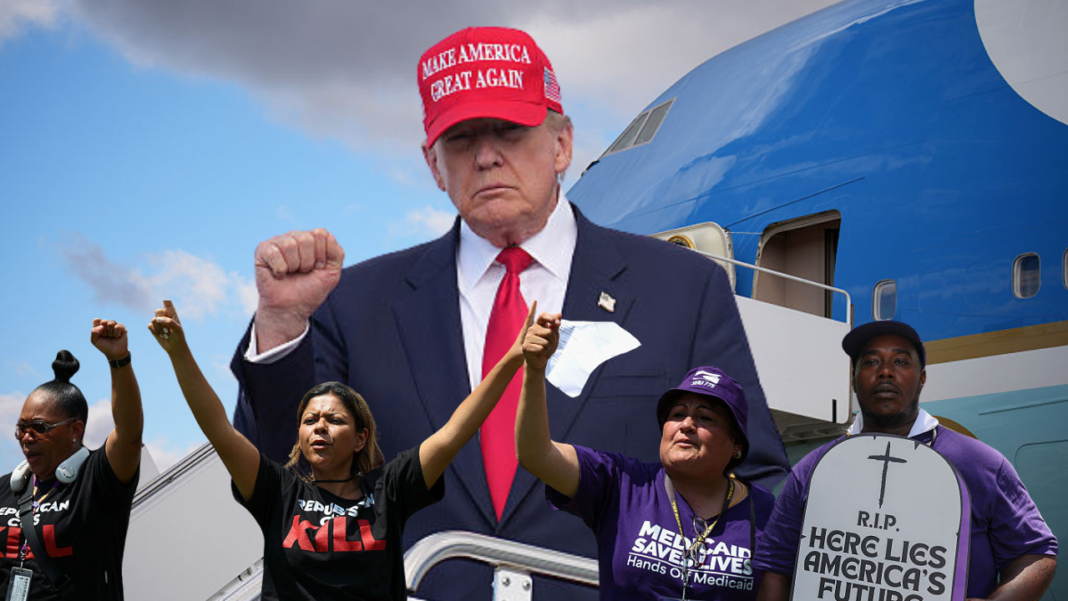The Government Shutdown: SNAP Benefits at Risk and Political Tensions Rise
As the federal government remains shuttered, millions of Americans are facing the grim prospect of diminished resources, particularly regarding food assistance through the Supplemental Nutrition Assistance Program (SNAP). With benefits set to expire on November 1, a critical lifeline for those in need is suddenly in jeopardy. This situation arises amid ongoing negotiations—or lack thereof—between congressional Democrats and Republicans, leaving many vulnerable to hunger as the deadline approaches.
Trump’s Dual Roles: A Brief Respite and Fundraising Efforts
Former President Donald Trump recently returned from an international trip in Asia, but his focus quickly shifted back to his own interests and those of his political allies. While millions grapple with uncertainty, Trump opted to spend the weekend at his Mar-a-Lago resort in Florida. Here, he hosted a dinner for donors affiliated with MAGA Inc., a super PAC committed to steering his political agenda. This juxtaposition of leisure and political maneuvering underscores a growing disconnect between Washington’s political elite and the pressing needs of everyday Americans.
A Clash of Narratives: Democrats and Republicans
Despite the grave issues at hand, tensions between the Democratic and Republican parties have intensified. House Speaker Mike Johnson has yet to call Congress back into session to address the ongoing government shutdown. In a tweet that epitomizes the partisan conflict, the Trump White House accused Democrats of “ghosting” the public during this crisis, highlighting the critical nature of the situation while redirecting blame onto the opposing party.
Simultaneously, Democrats have remained on Capitol Hill, advocating for negotiations to restore healthcare funding and find a resolution to the shutdown. They have criticized the Trump administration for its refusal to allocate emergency funds to support struggling Americans reliant on SNAP. This unprecedented funding lapse—marking the first time SNAP has run out since its inception in 1964—sheds light on the gravity of the current political impasse.
The Demographic Impact: Who Will Suffer Most?
The implications of the SNAP funding crisis are widespread, affecting nearly 42 million Americans, among whom approximately 11 million are Black. A Pew Research Center report emphasizes that 27% of SNAP recipients identify as Black, underscoring the potential for disproportionate harm due to this policy failure. Activists and community organizations, such as Black Voters Matter, have spoken out against the decision-making process that prioritizes affluent Americans while leaving low-income families vulnerable to food insecurity.
Advocacy Groups and Leaders Speak Out
Statements from advocacy groups illustrate a palpable sense of urgency and outrage. Black Voters Matter labeled the situation as “unnecessary cruelty,” noting that families already facing economic hardships and inadequate access to healthy food are now at further risk. Alexsis Rodgers, political director at the Black to the Future Action Fund, highlighted that the harm inflicted by the government shutdown disproportionately impacts marginalized communities, particularly Black Americans.
Meanwhile, influential leaders like Bishop William Barber II have voiced strong calls for justice and fairness within American legislation. Barber criticized policies that seem intent on creating barriers for vulnerable populations, framing the situation in moral terms. He emphasized that the nation must aspire to fulfill its stated ideals of justice and welfare—not just for a select few but for all citizens.
The Call to Action: Negotiation and Accountability
Many Democratic representatives, including U.S. Reps. Ayanna Pressley and Alma Adams, have stressed the importance of bipartisan cooperation to restore SNAP funding and reopen the government. They criticize their Republican counterparts for their apparent absence while the crisis unfolds, urging them to return from their recess to engage in meaningful negotiations.
Pressley specifically pointed out the irony in lawmakers who impose strict conditions on those seeking food assistance while failing to show up to work themselves. This commentary reflects widespread frustration over the apparent inequality in responsibility among lawmakers.
A Broader Reflection: Consequences of Inaction
The impact of the potential SNAP depletion reaches beyond just the immediate recipients; it also poses an ominous threat to many of Trump’s own supporters. As highlighted by advocacy groups, the cuts will indiscriminately affect families in rural areas and conservative strongholds, showcasing a dire disconnect between party politics and the needs of constituents.
This situation not only raises questions about governmental accountability but also highlights the ongoing tension in American politics. Without a resolution, millions will likely face an uncertain future as essential programs falter amid a partisan standoff.
The Urgency of the Situation
As November 1 looms closer, the stakes could not be higher. The very essence of American values—supporting the vulnerable and promoting the general welfare—hangs in the balance as negotiations remain stagnant. The Biden administration and Congress are increasingly challenged to find common ground in a landscape marked by division, with the specter of hunger and hardship looming for millions of citizens.
Through structured dialogue and active engagement, there lies a possibility for resolution, yet the political will must exist among lawmakers from both parties to prioritize the lives of the American people over partisan battles. Only time will reveal how this high-stakes chess match will unfold and who will ultimately be affected by the decisions made—or not made—in the halls of power.



